| Listing 1 - 10 of 13 | << page >> |
Sort by
|
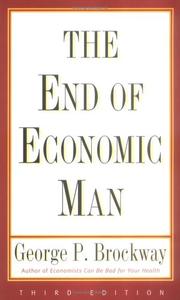
ISBN: 0393313522 Year: 1995 Publisher: New York London Norton
Abstract | Keywords | Export | Availability | Bookmark
 Loading...
Loading...Choose an application
- Reference Manager
- EndNote
- RefWorks (Direct export to RefWorks)
Economic conditions. Economic development --- Methodology of economics --- United States --- Economic man --- Economic theory --- Economics --- Economie (Science) --- Economie (Wetenschap) --- Economische wetenschap --- Economism --- Economisme --- Homo oeconomicus --- Political economy --- Politieke economie --- Sciences économiques --- Economic conditions --- United States of America
Book
ISBN: 9782895962991 2895962995 Year: 2019 Volume: 1 Publisher: Montréal: Lux,
Abstract | Keywords | Export | Availability | Bookmark
 Loading...
Loading...Choose an application
- Reference Manager
- EndNote
- RefWorks (Direct export to RefWorks)
L’expression «économie de la nature» a surgi dans le vocabulaire des sciences au XVIIIe siècle bien avant que le néologisme «écologie» ne s’impose à nous, plus d’un siècle et demi plus tard. Chez Carl von Linné, Gilbert White ou Charles Darwin, l’économie de la nature désigne l’organisation des relations entre les espèces au vu du climat, du territoire et de leur évolution. Cette économie pense l’imbrication des espèces, y compris les êtres humains, dans un réseau d’interactions incommensurables et impondérables. Mais très vite, les physiocrates, les premiers «économistes», la dévoient pour fonder une science de l’agriculture subordonnée à de prétendues lois du marché. Un détournement dont nous pâtissons jusqu’à ce jour. Tant que ne sera pas restitué son sens, le terme «économie» nous donnera l’impression de voir double dès lors que flanqué de celui d’«écologie». Il nous sera alors dit qu’il faut tenter de réconcilier l’une à l’autre, comme s’il s’agissait de deux champs distincts. Ce court essai s’emploie à redonner ses droits à l’économie de la nature.
Human ecology --- Sustainable development --- Economic development --- Economic aspects --- Environmental aspects --- Écologisme --- Écologie humaine --- Ecologie humaine --- Économisme. --- Services écosystémiques. --- Aspect économique. --- Philosophie. --- Human ecology - Economic aspects --- Sustainable development - Environmental aspects --- Economic development - Environmental aspects
Book
ISBN: 2130479154 9782130479154 Year: 1996 Volume: *17 Publisher: Paris: PUF,
Abstract | Keywords | Export | Availability | Bookmark
 Loading...
Loading...Choose an application
- Reference Manager
- EndNote
- RefWorks (Direct export to RefWorks)
Economic man --- Economism --- Economisme --- Homo oeconomicus --- Sociologie --- Sociology --- Economic man. --- Economics --- Decision making. --- AA / International- internationaal --- 330.00 --- Economische en sociale theorieën: algemeenheden. --- Economic theory --- Political economy --- Decision making --- Economische en sociale theorieën: algemeenheden --- Social sciences --- Human beings --- Self-interest --- Economics - Decision making.
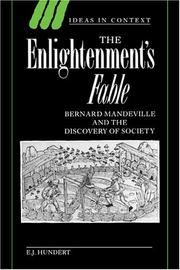
ISBN: 0521460824 0521619424 0511584741 0511005814 9780511005817 9780511584749 9780521460828 9780521619424 Year: 1996
Abstract | Keywords | Export | Availability | Bookmark
 Loading...
Loading...Choose an application
- Reference Manager
- EndNote
- RefWorks (Direct export to RefWorks)
The apprehension of society as an aggregation of self-interested individuals, connected only by bonds of envy, competition, and exploitation, is a dominant modern concern, but one first systematically articulated during the European Enlightenment. The Enlightenment's 'Fable' approaches this problem from the perspective of the challenge offered to inherited traditions of morality and social understanding by the Anglo-Dutch physician, satirist and philosopher, Bernard Mandeville. Mandeville's infamous paradoxical maxim 'private vices, public benefits' profoundly disturbed his contemporaries, while his Fable of the Bees had a decisive influence on David Hume, Jean-Jacques Rousseau, Adam Smith and Immanuel Kant. Professor Hundert examines the sources and strategies of Mandeville's science of human nature and the role of his ideas in shaping eighteenth century economic, social and moral theories.
Economic man --- Enlightenment --- Self-interest --- Conduct of life --- Self --- NIMBY syndrome --- Aufklärung --- Eighteenth century --- Philosophy, Modern --- Rationalism --- Homo oeconomicus --- Human beings --- Economics --- Mandeville, Bernard --- -Mandeville, Bernard --- -Contributions in economics --- Contributions in sociology --- Economism --- Economisme --- Eigenbelang --- Contributions in economics --- Mandeville, Bernard, --- Social Sciences --- Political Science --- Self-interest. --- Economic man. --- Enlightenment. --- Sociology --- History. --- Social theory --- Social sciences
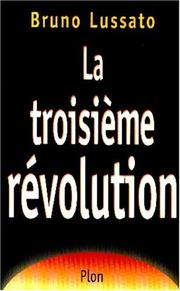
ISBN: 225918927X Year: 1999 Publisher: Paris Plon
Abstract | Keywords | Export | Availability | Bookmark
 Loading...
Loading...Choose an application
- Reference Manager
- EndNote
- RefWorks (Direct export to RefWorks)
Beschaving [Westerse ] --- Civilisation occidentale --- Civilization [Occidental ] --- Civilization [Western ] --- Economic man --- Economism --- Economisme --- Homo oeconomicus --- Occidental civilization --- Technocracy --- Technocratie --- Technologie en beschaving --- Technologie et civilisation --- Technology and civilization --- Western civilization --- Westerse beschaving --- Westerse cultuur --- AA / International- internationaal --- 203 --- Sociografie. Algemene beschrijving van de gemeenschappen (Sociologie). --- Twenty-first century --- Forecasts --- Economics --- Moral and ethical aspects --- Civilization, Modern --- Technology --- Civilization and machinery --- Civilization and technology --- Machinery and civilization --- Social aspects --- Sociografie. Algemene beschrijving van de gemeenschappen (Sociologie) --- Civilization --- Social history --- Philosophy
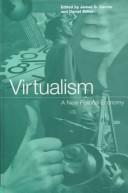
ISBN: 1859732372 1859732429 Year: 1998 Publisher: Oxford New York Berg
Abstract | Keywords | Export | Availability | Bookmark
 Loading...
Loading...Choose an application
- Reference Manager
- EndNote
- RefWorks (Direct export to RefWorks)
Economic conditions. Economic development --- Economics. --- Abstraction. --- Structural adjustment (Economic policy) --- Economic policy. --- Economic development. --- Capitalism. --- Economic man. --- Economie politique --- Abstraction --- Ajustement structurel (Economie) --- Politique économique --- Développement économique --- Capitalisme --- Homo oeconomicus --- Structural adjustment (Economic policy). --- Abstract thought --- Abstractie --- Ajustement structurel (Politique économique) --- Capitalism --- Capitalisme monopoliste d'État --- Economic development --- Economic growth --- Economic man --- Economic theory --- Economics --- Economie (Science) --- Economie (Wetenschap) --- Economische ontwikkeling --- Economische wetenschap --- Economism --- Economisme --- Kapitalisme --- Marché [Économie de ] --- Market economy --- Markteconomie --- Political economy --- Politieke economie --- Régime capitaliste --- Sciences économiques --- Structurele aanpassing (Economische politiek) --- Système capitaliste --- Économie capitaliste --- Économie de marché --- Économie libérale --- Politique économique --- Développement économique
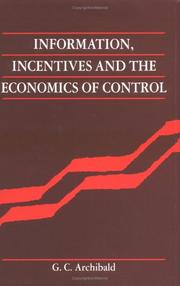
ISBN: 0521330459 0521022797 0511571712 9780521330459 9780511571718 9780521022798 Year: 1992 Publisher: Cambridge [England]: Cambridge university press,
Abstract | Keywords | Export | Availability | Bookmark
 Loading...
Loading...Choose an application
- Reference Manager
- EndNote
- RefWorks (Direct export to RefWorks)
This 1992 book examines alternative methods for achieving optimality without all the apparatus of economic planning (such as information retrieval, computation of solutions, and separate implementation systems), or a vain reliance on sufficiently 'perfect' competition. All rely entirely on the self-interest of economic agents and voluntary contract. The author considers methods involving feedback iterative controls which require the prior selection of a 'criterion function', but no prior calculation of optimal quantities. The target is adjusted as the results for each step become data for the criterion function. Implementation is built in by the incentive structure, and all controls rely on consistency with the self-interest of individuals. The applicability of all the methods is shown to be independent of the form of ownership of enterprises: examples are given for industries which are wholly privately owned, wholly nationalized, mixed and labour-managed.
Microeconomics --- Choice (Economic theory) --- Competition --- Concurrence --- Concurrentie --- Consommateurs [Préférences des ] --- Consommateurs--Préférences --- Consumers' preferences --- Economic man --- Economism --- Economisme --- Homo oeconomicus --- Mathematical optimization --- Mededinging --- Optimalisation mathématique --- Preferences [Consumers' ] --- Préférences des consommateurs --- Verbruikers--Voorkeuren --- Verbruikersvoorkeur --- Wiskundige optimisatie --- Mathematical optimization. --- Economic man. --- Consumers' preferences. --- Competition. --- Business, Economy and Management --- Economics --- Competition (Economics) --- Competitiveness (Economics) --- Economic competition --- Commerce --- Conglomerate corporations --- Covenants not to compete --- Industrial concentration --- Monopolies --- Open price system --- Supply and demand --- Trusts, Industrial --- Brand preferences --- Choice of product --- Preferences, Consumers' --- Product choice --- Consumer behavior --- Consumers --- Revealed preference theory --- Human beings --- Self-interest --- Optimization (Mathematics) --- Optimization techniques --- Optimization theory --- Systems optimization --- Mathematical analysis --- Maxima and minima --- Operations research --- Simulation methods --- System analysis --- Economic aspects --- Attitudes
Book
ISBN: 9061529409 Year: 1996 Publisher: Leuven : Davidsfonds,
Abstract | Keywords | Export | Availability | Bookmark
 Loading...
Loading...Choose an application
- Reference Manager
- EndNote
- RefWorks (Direct export to RefWorks)
#GGSB: Filosofie (21e eeuw) --- Academic collection --- Critique sociale --- Maatschappijkritiek --- economische orde --- kapitalisme --- sociale ethiek --- economische ethiek --- maatschappijkritiek --- maatschappijhervormingen --- 172 --- Economic assistance --- -Poverty --- -Developing countries --- -Academic collection --- #gsdbS --- 307.3 --- Comforteringsproces --- Economisme --- Egoïsme --- Idealisme --- Rechtvaardigheid --- Utopisch denken --- Weelde --- Destitution --- Wealth --- Basic needs --- Begging --- Poor --- Subsistence economy --- Economic aid --- Foreign aid program --- Foreign assistance --- Grants-in-aid, International --- International economic assistance --- International grants-in-aid --- Conditionality (International relations) --- 339.1 --- 304 --- Sociale ethiek. Sociale moraal. Sociale verantwoordelijkheid --- Sociologie van de welvaart --- (zie ook: sociale rechtvaardigheid) --- 172 Sociale ethiek. Sociale moraal. Sociale verantwoordelijkheid --- Poverty --- Armoede --- Sociale zekerheid --- armoede --- #A9610A --- 33 --- 330.1 --- Developing countries --- Economic conditions. --- Social policy --- Social problems --- Belgium --- Filosofie (21e eeuw) --- Maatschappij
Book
ISBN: 9791036504655 2760626563 2760622320 276063096X Year: 2000 Publisher: Presses de l’Université de Montréal
Abstract | Keywords | Export | Availability | Bookmark
 Loading...
Loading...Choose an application
- Reference Manager
- EndNote
- RefWorks (Direct export to RefWorks)
Marcel Rioux (1919-1992) a consacré une large part de son œuvre à envisager la société québécoise sous l’angle de la culture. C’est selon lui par cette voie que le Québec a pu se concevoir comme société nationale, susceptible de devenir le pays qu’il appelait de ses vœux. Publiés entre 1957 et 1987, les textes réunis dans cet ouvrage offrent une vue d’ensemble de la pensée d’un grand témoin de son temps. Durant ces trente années, Rioux a observé sur le vif la mutation de la culture, tant à l’échelle régionale (on pense à sa monographie sur Belle-Anse) qu’au sein des groupes sociaux (ses études sur la jeunesse) ou des institutions (ses travaux et propos sur l’éducation). D’une actualité surprenante, les écrits de Marcel Rioux peuvent être lus comme autant de manifestes contre le discours économiste qui prétend imposer une vision marchande de la culture.
Québec (Province) --- Social conditions --- Kempek (Province) --- Canada East --- Province de Québec --- Province of Québec --- Provinsie van Quebec --- Kvebek (Province) --- Правінцыя Квебек --- Pravintsyi︠a︡ Kvebek --- Квебек (Province) --- Κεμπέκ (Province) --- Kebekio (Province) --- Kebek (Province) --- 퀘벡 주 --- Kʻwebek-ju --- Kʻwebek (Province) --- Kupaik (Province) --- קוויבק (Province) --- Ḳṿibeḳ (Province) --- Quebecum (Province) --- Kvebeka (Province) --- Kvebekas (Province) --- Kébeki (Province) --- Кэбэк (Province) --- ケベック州 --- Kebekku-shū --- Kebekkushū --- ケベック (Province) --- Kebekku (Province) --- Provincia Québec --- קוויבעק (Province) --- Kvebeks (Province) --- 魁北克 (Province) --- Kuibeike (Province) --- Kui bei ke (Province) --- Lower Canada --- jeunesse --- économisme --- changement social --- culture --- idéologie --- Culture. --- Social change. --- Sociology. --- Youth --- SOCIAL SCIENCE / Sociology / General.
Book
ISBN: 9053562583 9063037104 Year: 1997 Publisher: Amsterdam, Antwerpen,
Abstract | Keywords | Export | Availability | Bookmark
 Loading...
Loading...Choose an application
- Reference Manager
- EndNote
- RefWorks (Direct export to RefWorks)
Methodology of economics --- Economic man --- Economie --- Economie féministe --- Economism --- Economisme --- Feminist economics --- Feministische economie --- Geschiedenis van de nieuwste tijden --- Histoire contemporaine --- Homo oeconomicus --- Marchés (Commerce) --- Markets --- Markten --- 330.1 --- #A9706A --- AA / International- internationaal --- 330.08 --- 330.40 --- Geschiedenis van het economisch en sociaal denken --- Evolution historique de la pensée économique et sociale: généralités --- History of the economic and social thinking --- 330.40 Geschiedenis van het economisch en sociaal denken --- 330.40 Evolution historique de la pensée économique et sociale: généralités --- 330.40 History of the economic and social thinking --- Economische grondbegrippen. Algemene begrippen in de economie --- Methodologie van de economie --- Domein en natuur van de staathuishoudkunde. --- Economisten. --- Geschiedenis van het economisch en sociaal denken. --- 330.1 Economische grondbegrippen. Algemene begrippen in de economie --- Economics --- History --- 20th century --- Economists --- Samuelson, Paul Anthony --- Tinbergen, Jan --- Domein en natuur van de staathuishoudkunde --- Economisten
| Listing 1 - 10 of 13 | << page >> |
Sort by
|

 Search
Search Feedback
Feedback About UniCat
About UniCat  Help
Help News
News